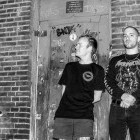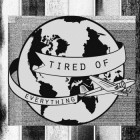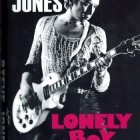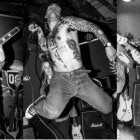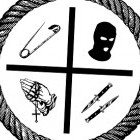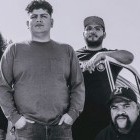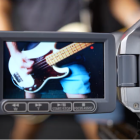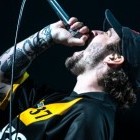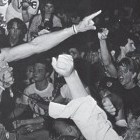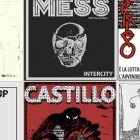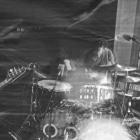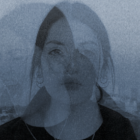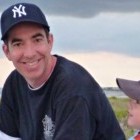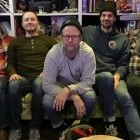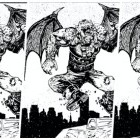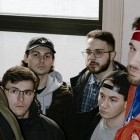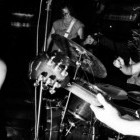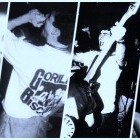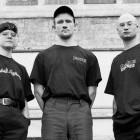.jpg)
In the early 1990s, as Youth Crew began to loosen its stronghold on the hardcore community, a handful of bands began introducing a darker, heavier, more exploratory edge to the genre. While crossover had already supplanted some of thrash’s speed and dexterity into hardcore’s sonic palette, it was bands like Starkweather, Integrity, Congress, Overcast, and a handful of others that initially incorporated European metal’s dark melodies, eclecticism and themes to the style, foreshadowing the metalcore sound that would dominate the subgenre and bring it to mainstream prominence in the coming decades.
One pioneering group that never truly reaped the reward of its trailblazing was Minnesota’s Krakatoa. While its members would go on to form such heralded and well-respected groups as Threadbare and Harvest, it was Krakatoa’s far-too-brief existence and its amalgam of dark metal, early emo, heavy hardcore and NWOBHM that was the foundation for much of what was to come.
This is the first instalment in a series of oral histories of bands who I personally feel were some of the unsung heroes of a formative era in hardcore’s history, a period that was a catalyst for the genre becoming more than simply a faster, heavier, angrier version of punk rock, but an immeasurably huge umbrella term for a mostly-DIY community that exists more in spirit than in a specific sound. For whatever reason, be it timing, resources, etc. many of the bands and members who would go on to influence or even make up the torchbearers of hardcore’s broad, new definition never received the notoriety and acclaim many felt they deserve, and I hope to shine a light on some of those artists.
—Dave Williams
***
What was happening in your musical and personal lives that led to Krakatoa's initial formation?
Carl Skildum (guitars): I had just wound down with my first band Tripwire with Chad (DeBoer, drums) and his brother Trent, who moved out of state for college. Chad's family soon moved to the same town where I was attending college, so we just kept up the idea of playing together. Dave (Walker, vocals) was a friend we had met at local shows and was a natural choice for us to try to start something new with. Our first bass player was Jason Bauer, formerly of Downside, which was another band that Tripwire played a lot of shows with.
Originally the band was called Engine and we played one show with that lineup. Jason was great but had to bow out since he lived a couple hours away and driving back and forth for practice every week was a bit much. I started asking around at my school to see if anyone knew a bass player who might be interested and was introduced to Roman, who was wearing a rad Rush jacket the first time I met him. Slam dunk.
Chad DeBoer (drums): I grew up in the Minneapolis area and my older brother Trent got a guitar at a young age. Trent and I started learning our favorite songs, mostly hardcore/punk stuff from the late '80s: Minor Threat, Bad Brains, Judge, Gorilla Biscuits, Youth of Today, some Metallica, Sabbath, Zeppelin. Trent had a good friend named Carl Skildum, and he was looking for dudes to play exactly what we were doing. We started out as Havok, still covering stuff, but Carl had a vision and, being such a crazy talented guitarist, it was just natural for us to start writing our own songs. With Carl's connections in the Minneapolis hardcore scene — he had a zine that was all about Midwest hardcore called Altered Reality — we found ourselves playing the infamous 7th Street Entry, opening for a Krishnacore group that featured members of aforementioned Youth of Today. It was a huge deal.
The following year, 1990, I was heading into high school and my brother was off to Madison, WI for college. We kinda kept it going without Trent, and he would come home a bunch and we would still play shows here and there. In 1992, my dad was laid off from his long marketing career at Honeywell. He found a gig south of the cities and we moved to Northfield. It just so happened that Carl was attending college nearby. Unfortunately, my brother couldn't be a part of it any longer, but Carl is a savant so we didn't need a second guitarist. Carl knew a young lad named Dave Walker from a very rural little town called Nerstrand and he was very into hardcore and wanted to be a vocalist. He was like a 'superfan' of ours. He knew all the lyrics, was wearing one of our t-shirts, it was rad. But we needed a bass player.
At class one day, Carl meets Roman R. Richardson. As soon as he and I started laying down some grooves, I knew this was my 'partner in rhythm'. So, we had our band: Dave singing, Roman on bass, me on drums and Carl, the guitarist and mastermind. We called ourselves Engine, then later found out there was already a band named Engine. My brother, Trent had a few different ideas for us and Krakatoa was one of them. Of course, years later we find out that there are like 6 or 7 different bands with the name Krakatoa.
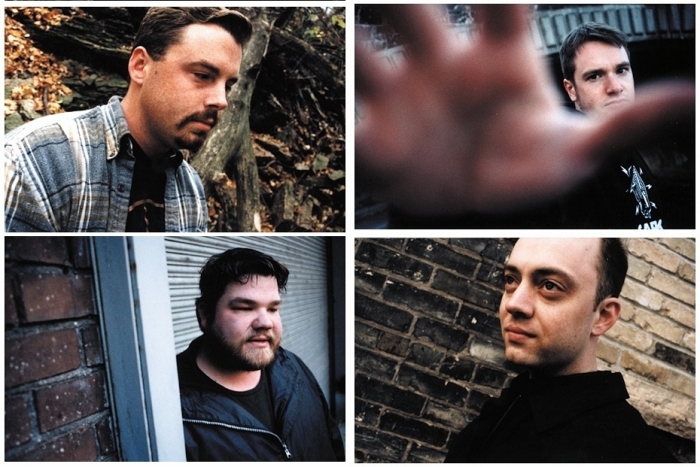
Roman Richardson (bass): I didn’t start playing bass until my first day of college when I bought one after being encouraged by a friend. I was into prog rock like Rush and Yes, new funky/prog stuff like Primus, Aquarium Rescue Unit, Bela Fleck & The Flecktones… all with amazing bass players. After a year and a half teaching myself to play along with that music, a friend of mine said Carl was looking for a bass player. I headed over to Carl’s dorm room and I think he was practicing Paganini’s 21st caprice. It was ridiculous and I wasn’t sure what I was getting myself into. Carl and I hit it off, he gave me a tape to practice to, and we played our first show together two weeks later. During those two weeks, I practiced those songs so much my fingers bled trying to get ready for that show. I recently found an ancient tape of the show and now have them as mp3s… it’s more than a little rough! It was a crash course for me, but we were up and running.
Dave Walker-Lecic (vocals): I was just finishing really my first band, Pillar, and then forming Rain. I was in a radio broadcasting school, living in my hometown near Chad and Carl and Roman who attended a college there. I knew Carl but Roman was new to me, coming from a slightly different background. When we played, I had no idea what I was doing. I'd had very little experience, I was 19, maybe 20. I knew how to actually sing, so I heard this type of music and thought that was what I should do. I know for a fact I was heavily influenced by Supertouch, Into Another and more metal acts. The music was bordering on so many influences, I couldn't quite put a name to it which, in the end, was a good thing.
Was Krakatoa part of a specific 'family' or scene of bands?
Carl Skildum: Since Dave and Chad were both from Northfield, they had a lot of friends in the southern part of the state outside the Twin Cities. So, we tended to play more shows in Northfield and Mankato. It was a weird time, we were around after some of the late '80s hardcore bands were winding down but before some of the more well-known touring bands from Minnesota started forming in the '90s. We only played shows between '92 and '93, when Chad finished high school and went to college in Florida. Dave went on to Harvest and I went on to Threadbare.
Dave Walker-Lecic: We played within the hardcore scene and surprisingly enough a bunch of Gravity records tours came through and we ended up on those shows. But back then there weren’t just the "like-sounding" shows that there are today. Like later in my days, I would play '90s metalcore alongside The Business or Hepcat. In retrospect, I’d have loved to play with more metal bands back then. I think that would’ve been interesting and possibly a different outcome may have occurred.
How did Dan and Second Nature come to be involved?
Carl Skildum: The four of us were all back in Minneapolis for a two week stretch in 1995 and thought it would be fun to quickly jam out a couple of new songs. Dave lined up Jamie (Woolford, engineer at Track Studios and of the bands Animal Chin, The Stereo, and Let Go) to record it and we just speed-wrote two songs and recorded them. We just did it for ourselves without a plan to release it, but the tape got into Dan Askew's hands and he offered to release it.
Dan Askew (Second Nature Recordings): I had met the guys in Harvest and asked them if they’d be interested in submitting a song for the A Document of Nothing comp I was working on. At some point, Dave mentioned in passing his old band Krakatoa and sent me a tape with those two unreleased songs. I popped the tape in and immediately got goosebumps. It still has the same effect on me today. I knew this needed to be out in the world. It was too good not to be. So, I asked them if I could release it as a 7” and they were down. Years later when discussion of a full length came up I definitely wanted to be involved. It was an unexpected treat.
“After an incredibly brief existence, Krakatoa called it a day, seeing its core members join Threadbare and Harvest. However, they would briefly reunite and reminisce in the summer of '95, in the process writing and recording the two songs that would form this seven-inch before once again disbanding. The two songs on Clouds Burned By Sunshine demonstrate the intrinsic link between hardcore and metal, with Krakatoa set firmly in the melodic metal sphere, echoing the new wave of British heavy metal greats but with a hardcore slant, most prevalent in the vocals and song construction, and foreshadowing the current trend of Gothenburg-influenced hardcore by years. While Clouds Burned By Sunshine was meant as an epitaph, it was a welcome taste of things to come.” (c/o Second Nature Recordings)
The band seemed to have three distinct phases of existence: the demo era, the 7" era, and the LP era. Is this simply a matter of outside perspective or was it always a side-project/'whenever we're free' type of vibe?
Carl Skildum: The demo was done during the '92/'93 phase while we were a live band. The 7" was definitely a quickie "we're all here so let's do this" thing. Then the LP was a similar situation where we had a block of time where everyone was back in town during the winter of '98/'99. At that point, we had established that this was just a studio project band, since everyone was still busy with other projects.
Dave Walker-Lecic: To be honest, I think the most memorable recording for me was the 7". In all the years of recording, I dislike listening to myself a great deal after the fact, but that 7" recording was just right. Something about the feeling of that day, the stream of consciousness that was that record. I would welcome a reunion just to play those two songs live. There was a tremendous magic about the early shows. Maybe for me more than others as I'd only played live in one other project but we played this show in Mankato for our demo and it was just chaos. It was a time-and-place thing and perhaps because Mankato had a scene that really appreciated our distinct sound.
.jpg)
Musically, Krakatoa incorporated a slew of different styles: heavy hardcore, Euro metal, Midwest emo, etc., and in a very dynamic yet always-cohesive fashion. Was that the intention from the outset or was it a combination of what each member brought to the table?
Carl Skildum: I remember at the very beginning that we didn't want to do the youth crew style of hardcore that was still pretty well-represented around here. I was always an aspiring metal guitarist even back then, so I advocated for some of those elements, and lots of guitar solos for beginners. I felt like Chad had a love for hip-hop and Roman was into funk and jazz so they brought a groove to it that would never have occurred to me on my own. When I first met Dave, I remember we talked about Dag Nasty and the fact that he dug Dave Smalley's vocals a lot. I think that was an early influence before he found the heavy voice he used in both Harvest and the Krakatoa 7" and LP.
Dave Walker-Lecic: For me, Krakatoa went over a broad spectrum. At the time, we were watching NYHC bands, Inside Out was huge, Iceburn, Heroin, John Henry West, Victory bands, etc. and then there were our common roots in metal. Like all metal. We ate it up and all still do. But I didn't do vocals like I do today or did on the later records, which made it a very different animal. I know some would prefer I never did but, at that time, we were into it.
Roman Richardson: From my perspective, it was just music. Unlike the other guys, I knew absolutely nothing about the hardcore scene or the local scene as I was and still am into very bass-heavy prog and funk stuff, as I mentioned before. To me, we were doing our own thing and it seemed pretty unique. With Carl’s guitar wizardry, Dave’s powerful vocals, and Chad and I bringing some… I won’t say “funky," but more of a “groove” feel than some other bands we played with, I thought it was really cool. I also liked how we could break down from the heavy stuff and quiet/slow things down for a bit, mix in different vocal styles from Dave and Carl, then come charging back in, which I think really gave us a broad dynamic and emotional range. I still like it.
“After the dissolution of Threadbare and Harvest, and spurned on by the acclaim afforded the Clouds Burned by Sunshine seven-inch, Krakatoa would briefly reform once again to release its debut full-length, Channel Static Blackout, before dissolving once again into the ether of its members lives. Channel Static Blackout is a metal album in the truest sense of the word, created and conceived before the current trend of death/black metal-influenced hardcore that is currently gaining notoriety. Galloping riffs, harmonized leads, nods to both '80s thrash and Priest/Maiden-influenced power metal, acoustic passages and a temperamental atmosphere tempered with hardcore's more focused vision and the vicious, brutal vocals of former Harvest screamer Dave Walker all collide on Channel Static Blackout.
Melodic metal heroes such as Iron Maiden, In Flames and the Gothenburg metal movement may make for easy comparisons, but Krakatoa's identity shines through. Incorporating a bleaker, darker take on metal and lyrically eschewing dungeon and dragons imagery to weave a tale of betrayal, despair and redemption, Channel Static Blackout stands as a powerful metal album, but without the shame that usually accompanies metal albums. Self-dismissed as one of the most unimportant and obscure bands of the '90s, the tragedy is that they would be leading the metallic movement currently in hardcore if they ever reformed.” (c/o Second Nature Recordings)
The three recordings all sound quite different from one another (no doubt due to the technological advances between 'eras'). Do you have any specific memories from the different recording sessions?
Carl Skildum: I can't really listen to the demo. It's just us figuring out how to be a band and find our own voices. The 7” was super quick, but really fun. I remember I just did my guitar takes in one shot, one on the left and one on the right, including just winging the harmonized solos on each side, which is why you can hear there are a couple places where I blew it. But we were recording to tape so editing and punching in was a pain and we just let it ride. The LP was with Dave Pinsky at Gark Studio. He also did Harvest's first LP, Season of Fire, Picturesque and some Threadbare recordings as well. So, he was a pal of ours as well. That's one of those records where I wish I would have spent more time on the guitar tone. Other than that, I remember it being a really fun session.
Jamie Woolford (engineer): The LP recording session was over twenty years ago, so I’m pretty fuzzy on the particulars but I do remember being stoked on the band and their musicianship. It was still the late '90s and Pro Tools had not taken hold quite yet, so most of the studios were either expensive day-rate, analog tape-based studios or a more affordable ADAT (a short-lived digital tape format) studio. Interestingly, a guy I knew had leased the top floor of a huge office building and setup a small project studio that centered around an eight-track tape machine, so we chose to work there instead. Although there was very, very limited gear, the space was quite large and easy to work in.
I recall being impressed with the band’s musicianship because back then you didn’t have an engineer that could edit you into perfection, you just had to play well and these guys did. In particular, Carl’s guitar playing was not only great, his vision for tone and performance was quite refined for a band in this genre. I had also recorded Dave several times with Harvest so we already had a solid comfortable working relationship. His tracks sounded tough as nails and he did them fast. In fact, as far as I can recall, the whole band was great, well-prepared and the takes (which were few) went super-fast and with minimal effort. I think we setup, tracked and mixed the whole thing in one night. Not too difficult considering it was eight tracks but we did put in our time before tracking to get the sounds everybody seemed happy with.
Roman Richardson: I barely remember the first two, but I remember recording Channel Static Blackout at Gark Studio very well. It was the first time I was in a “real” studio and, with Dave Pinsky at the helm, we were in good hands. This was just before everything went digital so it was all on tape and Gark had a killer setup. I really enjoyed the process and that we took the time, and money, to do it right. Carl thrives in the studio and I remember him sitting next to Dave Pinsky right at the soundboard laying down part after part after part. In particular, the end of “Memory Cage” was track after track of guitar, most I think he improvised on the spot until it was a huge wall of guitars. It is still the best sounding recording I’ve been involved with.
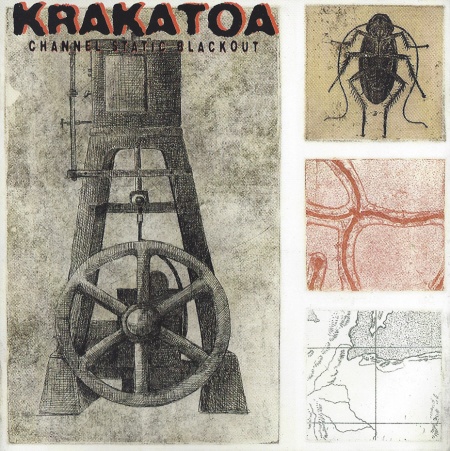
To me, anyway, Krakatoa has always seemed like a very 'cult' band, or, dare I say, a musicians' hardcore band. Do you get a lot of posthumous love? People begging for a reunion?
Carl Skildum: It's always great to hear from people who remember this band, but I don't hear that much about it anymore. It was such a brief blip for most people, and not being a touring band compared to some of the other things we did might have something to do with that.
Roman Richardson: Every now and then something pops up online, which is fun. I do get some family and friends who occasionally say things like “Man… I still love Channel Static Blackout!” That makes me happy.
Dave Walker-Lecic: I get asked about Krakatoa or its association with me in most references, "Dave from Harvest/Krakatoa" and so yes, it's out there. I have literally no idea if there is a demand for the Channel Static Blackout LP but I'm hoping to repress it on my label, Hardcore Matinee, after I sell out of the Harvest Living With a God Complex reissue. Dan Askew fully endorses this too. Chad and I will reinterpret the layout for a hand-crafted release and it will likely be a super small, limited pressing. Since we did not play live after the demo, I think there would be a demand for one local show if we could pull it off to celebrate the LP and, to be honest, I would love to be able to play some of these songs live for people. Krakatoa, for me, was an always experiment in extending myself and challenging each other to do things we hadn't done before. I truly love it.
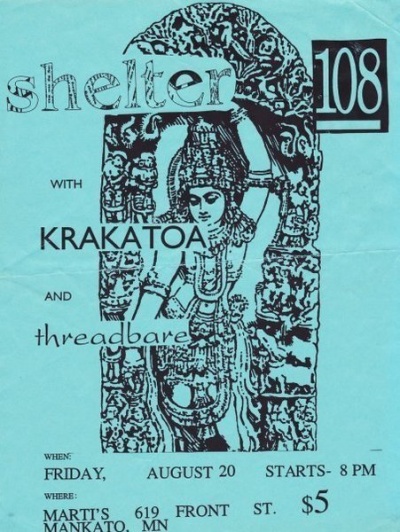
***
If you dig No Echo, you can donate a few bucks to help with the site's operating costs:
Tagged: krakatoa, oral history

